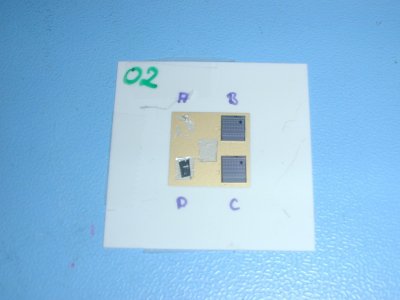|
Irradiation
test of STAYSTIK thermoplastic adhesive film no. 571
M.Moll, C.Joram, I.McGill
Skip all the description and jump to the conclusion
|
| Die
Shear Adhesion @ 25°C: |
>
2000 psi
> 13790 kPa (Pa
= kg/(ms2) = N/m2)
> 13.8 N/mm2
> 414 N/die with
a die of 5x6mm2 |
|
- Preparation of samples (6 June 2002):
Support:
Ceramic sample holders (5x5cm2) with thin square shaped
gold layer in middle (2x2cm2).
Samples to be glued:
For shear test: Microelectronic chips (OPAL-experiment) of 6x5mm2
For conductivity test:- Pieces of Aluminum foil of 6x5mm2
Gluing:
The ceramic sample holder was placed on a hot plate of a die
bonder (170oC) and 6x5mm2 pieces of the Staystik-film
were placed on the hot ceramic sample holder. Afterwards the chips and
the pieces of aluminum foil were placed with a die bonder on the hot
staystik film.
Figure of the sample:

5 such samples were produced
-
Irradiation of samples (6 - 12 June
2002)
4 samples were irradiated with 24 GeV/c protons at the CERN
irradiation facility IRRAD1.
Great care was taken to measure the irradiation fluence for each
individual chip and aluminium.
| Sample |
Chip, left,up |
Chip,right,up |
Chip,right,down |
Al,left,down |
| Sample 01 |
non |
non |
non |
non |
| Sample 02 |
(531) |
(532) |
(533) |
(534) |
| Sample 03 |
2.5e14(535) |
(536) |
3.3e14(537) |
(538) |
| Sample 05 |
(539) |
(540) |
3.6e14(541) |
3.9e14(542) |
| Sample 04 |
1.2e15(543) |
1.2e15(544) |
1.7e15(545) |
1.4e15(546) |
Table.: 24GeV/c proton fluence [p/cm2] and in brackets the
label of the according dosimeter. Details about the dosimetry including
measurement errors for the individual dosimeters can be found here.
-
Conductivity test
The resistivity was measured with a Keithley 2410 between the
Gold -layer and the Aluminium foil.
| Sample |
Fluence |
resistivity [ohm] |
| Sample 01 |
non |
1.6 ± 0.2 |
| Sample 02 |
|
1.2 ± 0.2 |
| Sample 03 |
3e14 |
2.4 ± 0.2 |
| Sample 05 |
3.9e14(542) |
2.3 ± 0.2 |
| Sample 04 |
1.4e15(546) |
1.4 ± 0.2 |

|
|
Conclusion:
Also
no quantitative values can be given for a shear test, the performed
experiment demonstrated that the adhesive film is still holding electronic
chips sufficiently strong after an irradiation with 24 GeV/c protons of up
to 1.7e15 p/cm2. The chips were strongly attached to the film and could not easily be
removed by hand. Within the resolution of the conductivity measurement no
change of the resistivity of the film was observed (<1W
for a 6x5mm2 piece)
|
